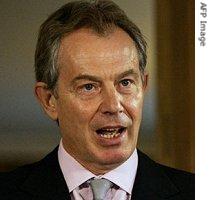-
(单词翻译:双击或拖选)
London
26 June 2007
One of British Prime Minister Tony Blair's biggest concerns has been the plight1 of Africa, once describing it as a "scar on the conscience of the world." For VOA Tendai Maphosa takes a look at Mr. Blair's African legacy2 as he prepares to step down this week.
 |
| Tony Blair |
Mr. Blair furthered his Africa agenda two years ago when Britain held the rotating presidency3 of the Group of Eight industrial nations. He made sure that the reduction of poverty in Africa was at the top of the agenda of the G-8 summit in Scotland.
Despite his efforts, some say Mr. Blair achieved very little for Africa.
"I think from the western, British point of view, yes he has pushed Africa up the agenda and that has been very important, created a lot of debate about it," said Richard Dowden, the director of the Royal African Society. "I also think he bought in the aid agency view of Africa ... of Africa as a hopeless starving continent full of wars and famine, and Africa needed almost to be saved from itself. He approached it in rather a missionary4 sort of way and rather discounted African voices on Africa and was not very sensitive in dealing5 with Africa and Africa's problems."
Dowden added that Africans also changed their opinion of Mr. Blair when he joined the United States in invading Iraq. He said some viewed his intervention6 policy as imperialistic7.
Vincent Magombe of Africa Inform International, a London-based media agency, says Mr. Blair should have been tougher on corruption8 on the continent.
"I think Tony Blair has talked too much, he is a very, very bright man and he definitely has a lot of bright ideas," he said. "But Blair was not able to ask Africa leaders to make sure that they are responsive to the aspirations9 of the population, that they are democratic, that they respect human rights and I think that failure will lead Africa to worse times rather than better times."
One country some critics say will be the Achilles' heel for the Blair legacy is Zimbabwe.
Zimbabwe Information Minister Sikhanyiso Ndlovu blames the Blair government of reneging on an agreement to fund land reform in Zimbabwe. He says this led to the seizure10 of white-owned farms for the re-settlement of landless blacks and the imposition of sanctions on the country.
"We are saying good riddance as far as our Zimbabwean government is concerned, as we do not want interference in our internal affairs as a sovereign state, which Blair did not recognize, he did not recognize us as a sovereign state, which has its own policies to make," he said.
But Zimbabwe opposition11 leaders have criticized President Robert Mugabe of politicizing the land-reform process and using it to enrich his supporters. Many African and Western governments have distanced themselves from Mr. Mugabe's policies.
Some critics say another real challenge for Mr. Blair was Darfur, where Sudan's government has been accused of genocide in fighting a rebel movement. Because of Britain's involvement in Iraq and Afghanistan, the prime minister did not have the military resources, the international clout12 or domestic support for any foreign military intervention elsewhere.
"Darfur really shows the limits of even the most interventionist and progressive governments can do when it comes to the problems of these parts of the world," said Tom Cargill, the Africa program manager at the Chatham House think tank. "Before Iraq, liberal interventions13 were the order of the day and of course Sierra Leone which will quite rightly be remembered as one of his interventionist triumphs in Africa was going to be the model for these intractable conflicts but Iraq changed all that."
But widely seen as successes, Tony Blair's visit to Tripoli in March 2004 and his meeting with Colonel Gaddafi symbolized14 an extraordinary turning point in relations with one of the most troublesome regimes in North Africa and the Middle East.
Mr. Blair was also passionate15 about the HIV and AIDs issue in Africa. His government supported programs aimed at combating the pandemic and lowering infection rates in many African countries.
 收听单词发音
收听单词发音
1
plight

|
|
| n.困境,境况,誓约,艰难;vt.宣誓,保证,约定 | |
参考例句: |
|
|
|
2
legacy

|
|
| n.遗产,遗赠;先人(或过去)留下的东西 | |
参考例句: |
|
|
|
3
presidency

|
|
| n.总统(校长,总经理)的职位(任期) | |
参考例句: |
|
|
|
4
missionary

|
|
| adj.教会的,传教(士)的;n.传教士 | |
参考例句: |
|
|
|
5
dealing

|
|
| n.经商方法,待人态度 | |
参考例句: |
|
|
|
6
intervention

|
|
| n.介入,干涉,干预 | |
参考例句: |
|
|
|
7
imperialistic

|
|
| 帝国主义的,帝制的 | |
参考例句: |
|
|
|
8
corruption

|
|
| n.腐败,堕落,贪污 | |
参考例句: |
|
|
|
9
aspirations

|
|
| 强烈的愿望( aspiration的名词复数 ); 志向; 发送气音; 发 h 音 | |
参考例句: |
|
|
|
10
seizure

|
|
| n.没收;占有;抵押 | |
参考例句: |
|
|
|
11
opposition

|
|
| n.反对,敌对 | |
参考例句: |
|
|
|
12
clout

|
|
| n.用手猛击;权力,影响力 | |
参考例句: |
|
|
|
13
interventions

|
|
| n.介入,干涉,干预( intervention的名词复数 ) | |
参考例句: |
|
|
|
14
symbolized

|
|
| v.象征,作为…的象征( symbolize的过去式和过去分词 ) | |
参考例句: |
|
|
|
15
passionate

|
|
| adj.热情的,热烈的,激昂的,易动情的,易怒的,性情暴躁的 | |
参考例句: |
|
|
|















